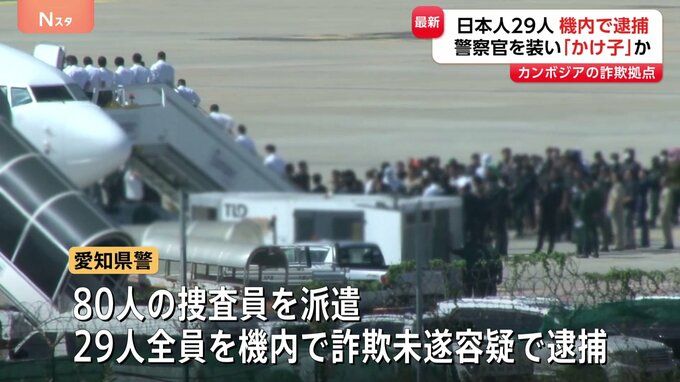Twenty-nine Japanese nationals suspected of involvement in special fraud were transferred from Cambodia today and arrested. It is said that many Japanese are being recruited to multiple fraud bases managed by Chinese-affiliated organizations in Cambodia. We investigated the actual situation.
«A bus carrying 29 Japanese nationals has left the immigration facility. It is heading to the airport.»
Today, 29 Japanese men and women ranging from their teens to fifties were transferred from Cambodia’s capital, Phnom Penh.
«The suspects are getting off the bus one by one. They are boarding the aircraft.»
This is the largest number of people transferred from overseas at once in history. Aichi Prefectural Police dispatched 80 investigators and arrested all 29 individuals on the aircraft.
The fraud base was located in Poipet, a northwestern city lined with Chinese-affiliated casino hotels. It was managed by a Chinese-affiliated organization, and according to local residents, it had close ties with local police.
«It’s on land owned by a local police executive, and security guards are strictly monitoring it. Outsiders cannot enter, and it’s too scary to approach.»
The 29 individuals are believed to have made fraudulent phone calls posing as police officers, targeting Japanese people under the direction of Chinese individuals.
When local authorities raided the site in May, a large number of smartphones and items resembling police uniforms were seized.
In recent years, Cambodia has seen a series of crackdowns on fraud bases involving Japanese yakuza and criminal groups known as «Tokuryu.» However, it is believed that cases of Chinese-affiliated criminal organizations gathering Japanese people to act as «callers» in fraud schemes have been increasing particularly recently.
A Japanese man recruited to a fraud base: «I want to go buy food and drinks. I don’t know if I can go alone, so I just wanted to ask.»
Footage obtained shows a Japanese man being «recruited» to a fraud base in Cambodia. A Japanese man in his forties is negotiating terms of payment and living conditions with individuals related to a Chinese-affiliated organization.
When speaking with a Thai broker who claims to have arranged this man’s placement at the request of a Chinese agent…
«A Chinese investor introduced him to me, and we made a deal for $45,000 (approximately 6.6 million yen). He ran out of money from gambling and started committing fraud.»
The broker interviewed stated that there are cases resembling «human trafficking,» where Japanese individuals who fail to meet fraud quotas are placed under the control of fraud groups and sold off to other bases.
«Japan has many elderly people with money who are easily caught in fraud. That’s why the demand for Japanese is the highest.»
Meanwhile, a Thai national who claims to have escaped from a different Chinese-affiliated fraud organization last month testified that «there were about 15 Japanese people at the same base.»
«(The Japanese) would always throw parties when they succeeded in fraud. They would have banquets until the money ran out or go buy expensive items.»
Fraud bases are not only seeing more sophisticated methods but also increasing internationalization of organizations. Japanese police plan to strengthen crackdowns in cooperation with overseas agencies.






